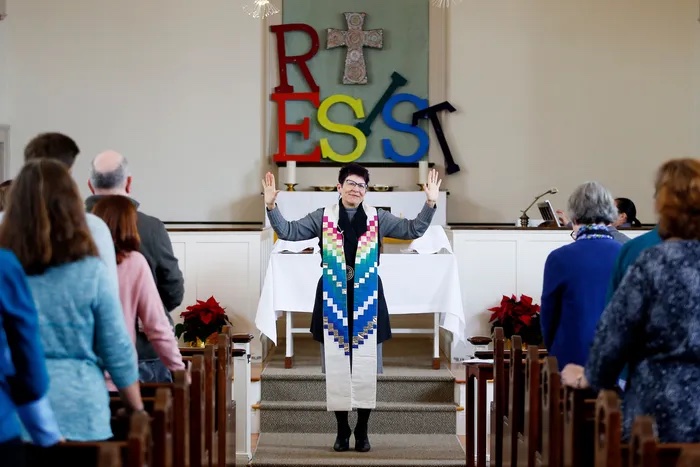
By Ed Kilgore
Another shoe fell last week in the ongoing process of Protestant religious denominations splitting over efforts to accept or reject equality for LGBTQ folk in the pews and in the clergy. Conservative members of the United Methodist Church, the largest mainline (e.g., non-Evangelical) denomination and the second largest Protestant denomination (behind only the Evangelical Southern Baptist Convention) announced that on May 1 they will be launching a major new grouping of congregations to be called the Global Methodist Church, as the Atlanta Journal-Constitution reports.
So Methodists hewing to a homophobic view of godly behavior can’t wait on the division of churches and property informally agreed to by the UMC in 2019, and are striking out on their own. They are seeking a flat divorce settlement of $25 million to cover the church properties they will now seek to recruit from a denomination that has been very closely divided on the issues generating the split (mostly acceptance or rejection of same-sex marriages and ordination of non-celibate gay clergy). The UMB is arguably the most conservative of the mainline Protestant groupings, especially in the South, where Methodists often are not all that distinguishable in their faith, culture, and politics from their Evangelical neighbors.
The UMC is going through a sorting-out on LGBTQ equality that has already occurred in other mainline denominations. Episcopalians, the largest Lutheran group, and most recently the largest Presbyterian group have accepted full equality, at the cost of losing some members. The more liberal United Church of Christ (a.k.a. Congregationalists), the Society of Friends (Quakers), and the Unitarian-Universalist Association accepted LGBTQ equality with less controversy. Some mainline denominations, including the Christian Church (Disciples of Christ) and the Progressive National Baptist Convention (of which Dr. Martin Luther King Jr. was one of the founders), defer to local congregations on such matters, but put no obstacles in the way of those who want to bless same-sex marriages or ordain gay clergy.
Most Evangelical Protestant denominations and conservative spinoffs from mainline churches reject LGBTQ equality with greater or lesser militancy. Beyond Protestantism, of course, the Roman Catholic Church, while not as uniformly conservative as its Evangelical cousins (with whom it sometimes cooperates on issues like abortion and so-called “religious liberty”) continues to regard active homosexuality in any form as “intrinsically disordered” and thus as sinful, even though Pope Francis has struck a new tone of friendly tolerance short of full acceptance. Eastern Orthodox churches are typically even more resistant to LGBTQ equality as Catholics, though lay members do not appear to be as conservative on such issues as clergy or the hierarchy.
More generally, you can argue that U.S. Protestantism, and even Christianity itself, are evolving toward big left-right coalitions divided over cultural and even political issues (driven in part by divisions over scriptural “inerrancy,” which often drives conservatives seeking validation for their cultural and political views), with the old denominations (mostly imported from Europe) becoming steadily less important and distinct. It’s probably a confirmation of a paradigm shift in religious faith and practice that Methodists are no longer “united” while friends and enemies of an open and affirming stance toward all believers seek alliances with each other.
Complete Article ↪HERE↩!
